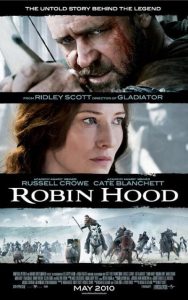
Rating: 3 of 5 




It’s summer movie season again!
The problem with a Robin Hood movie is that it inevitably draws comparisons to the story we know and the Kevin Costner version we all grew up with.
Ridley Scott’s Robin Hood is beautiful, full of deep rich colors, gorgeous shots and fast, engaging action. But we expect nothing less from Scott who is a great director.
Brian Helgeland (who also wrote A Knight’s Tale) changes the story of Robin Hood so that it’s not entirely what we expect, which I think is good. It keeps us involved as an audience because we don’t necessarily know who these people are or what happens next?
What happens when you sap Richard the Lionheart of his nobility? What happens when you infuse the story with political intrigue? What happens when Robin and Marion have to fall in love? It’s all interesting, even if it’s not all good.
My biggest issue with the film was Richard the Lionheart. I get that Ridley Scott doesn’t think men in power can be noble, that only the everyman can really live with honor. And I admit that history is full of the corruption of the powerful. But the word nobility wouldn’t mean what it does if there weren’t also good men and women in history who wielded sovereignty well.
Richard the Lionheart has a very specific role in this story. He is the good king, the contrast to Prince John. He inspires Robin and his men to fight in his absence because he has ruled well which taught them that men do not deserve to live under the yoke of tyranny; they’re better than that. He is the king who teaches us that mercy and justice are better than fear and oppression.
When Richard is diminished, who teaches Robin what it means to live with honor? If he is corrupt and godless, who has shown him that good luck cannot be repaid with bad grace or it leads to darkness? Who has shown them they can live in a better world?
We need a good king in this story because Robin, though a good man, is not a king.
All the other changes to the story I liked and thought worked well.
It feels unnecessary to comment on Russell Crowe or Cate Blanchett’s performances because they are always good. Blanchett’s Marion is fierce and strong as we expect her to be. Crowe’s Robin has a simple goodness, as Scott’s epic heroes always do. He is a strong, honest, brave, slightly playful man. Crowe is a rather sullen Robin. There are slight moments of levity, but I think it’s a performance that fits the actor more than the character.
ETA: While I don’t agree with most of Variety’s review (I like that it’s more serious minded then previous incarnations and I actually liked Kevin Costner’s version), they do have a point about Robin’s character.
“… there’s no twinkle of merriment in his eyes, nothing to suggest a man who would not only be outraged by poverty and injustice, but wily enough to make sport of those responsible.”
Robin’s band of merry men are fantastic. They are funny and authentic and it’s interesting to watch them evolve, from simple men with few manners to heroes because from the beginning they are strong and fearless and well trained. Who wouldn’t fall in love with that?
The boys of Sherwood are awesome and I wish they’d been given more to do. I don’t know who those kids were but they were strong and fierce and great little men. Not only do I wish they’d been more a part of the story – I wish they’d been better credited so I could follow them and see what they do next and if they’re able to have thriving careers. Because they were great. They were a fascinating part of the story that went completely unexplored.
The score (by Marc Streitenfeld) is beautiful and I am blown away it’s not on iTunes at all. frustrated and blown away.
All I wanted to do was come home and download it and listen to it while I wrote all this, living in that world a little longer. But I was mostly denied (I finally found some random site that is letting me listen to 30 second clips of 5 of the songs. Not much, but it’s enough for today). The score is the beauty and power over the story that tells us we can be that strong.
The film is also tarnished by the end. Ridley uses Marion to make a political speech about how we should all live within our own authority and with no one sovereign above us. But the story is so much better than that. It’s about loyalty and fear and power and strength. Don’t diminish it by trying to make it a statement.
Part of my other frustration with how political the film is, is that I want to sit down with Ridley and say, “Do you not realize you’re making contradictory statements? That your hero espouses a thoroughly republic view of authority and then Marion proclaims they live quite happily in a democratic world?
I have to admit I’m a little worried. I wonder if it won’t do as much at the box office as people are hoping/expecting because it’s vying for the same demographic as Iron Man 2. Then I’d have one great movie and one good movie that didn’t get the notice and acclaim they deserve because of damn Iron Man.
ETA: Having seen Iron Man (and, ok, The Avengers) I like Iron Man better than Robin Hood. So I retract half of that last statement.
| Writing: |      |
| Characters: |      |
| Performances: |      |
| Directing: |      |
| Production: |      |
| Overall: |      |